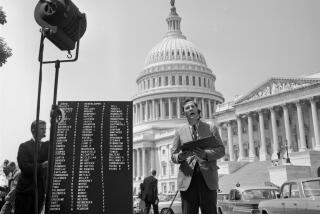Independence Has a Wry Meaning in a Land Searching for Pride
- Share via
I wonder what Americans feel about their Independence Day: pride at being a part of such a powerful country, indifference since the events being celebrated lie so far in the past, pleasure that the holiday provides hard-working people another day off? Probably all at once.
The only feeling I’m sure that Americans don’t have is surprise at having this holiday in the first place. They don’t have to ask themselves why they are celebrating July 4 and what they are independent from. They all know that in 1776 the Declaration of Independence was signed and a new nation was born.
Russians have not been that lucky. Although they have celebrated their own Independence Day for six years now, its history and relevance are obscure.
Last month I visited Moscow to catch up on recent developments and see old friends--keeping in touch in every sense. I also had to get a new American visa, since my old one had expired. I thought that in this new age of Russian-American friendship it would be an easy task, but it proved otherwise, precisely because of this friendship. Everything I experienced in the U.S. Embassy seemed to me Russian in origin. Unlike six years ago when the U.S. and the Soviet Union were still divided ideologically, there were now no real guards, just a lone Russian officer behind a window lazily glancing through whatever document one happened to have. There was no screening, no metal detector and no American personnel. (I understand that the ambassador is still American, however). “Mir--Druzhba” (peace and friendship) between the two countries has gone so far that the United States now trusts Russian citizens to serve American interests. I’ve been to many American embassies in many countries; nowhere have I seen as many locals working as there are in the one in Moscow, capital of America’s former Cold War enemy.
While the Americanization of Russia is considered to be a problem for Russia, it seems to me that the Russification of the American Embassy is becoming a problem for America.
As a Russian, I should not consider Russification such a bad thing: Why should it be only the United States that exerts influence in the world? But after living in the States for six years, I am convinced that there are certain American qualities that Russians ought to acquire--things like straightforwardness, efficiency and punctuality. Despite the general Americanization of Russia (McDonald’s, Hard Rock Cafes, Baskin-Robbins and Dunkin’ Donuts abound), Russians have failed to pick up America’s all-important professionalism and have retained their lackadaisical working habits.
Russia has never been a hard-working country. Now, despite the move toward a capitalist economy with its motto, “Time is money,” Russians still take a relaxed approach to work. (The only exception is on the roads, where all drivers speed through red lights as if they have the most urgent business to attend to). Coming back from abroad, I was stunned by the number of holidays the country celebrates nowadays. All sorts of occasions--religious, political, professional, cultural--mean a day off from work. Indeed, if a holiday happens to fall on Sunday, Monday becomes a day off as well.
At the U.S. Embassy, I was told that my visa would be ready on June 12, a Thursday. When I got there that day, the embassy was closed. First I feared that for some unknown reason, and despite all the friendship and peace, diplomatic relations between our two countries had suddenly been severed.
But it turned out it was simply a holiday. A policeman (Russian) who emerged from the gates said “Closed. Independence Day.” “What? It isn’t the 4th of July, is it?” He yawned. “Strange people. No one remembers. Today is Russia’s Independence Day!”
And then I remembered: When he was elected president of Russia in 1991, Boris Yeltsin autocratically declared election day a holiday. The Soviet Union still existed, and this move on Yeltsin’s part was meant to show Soviet President Mikhail Gorbachev that Russia had its own independent interests, separate from Soviet ones. When the Soviet Union collapsed two months later, the idea of Russian independence quickly lost its meaning and necessity--people joked that Russia had finally become independent from Georgia, Latvia, Ukraine and the other republics.
Deceived, perhaps, by the fact that Russia officially has its own democratic independence holiday, the efficient Americans foolishly relied on Russian locals to staff their embassy. But Russians, loyal to their traditional laissez faire (unchanged even in the American surrounds) scheduled visa pickups on Independence Day, ignoring the existence of this meaningless holiday. Apparently they remembered in time to take the day off.
A few days later I received my visa. The same day, Yeltsin finally decided that, after six years of unsuccessful attempts to celebrate a meaningless independence, he would try to reawaken patriotic feelings by renaming this holiday the “Day of Russia.” This doesn’t contain any real meaning, either, though the holiday does now play on Russian’s shattered national pride (what is there to be proud of, really?) and, more important, continues to give the Russian people a day off (in a country as indolent as this one, holidays are a good way for the government to keep the people’s approval).
Sad as it is, most of the brand-new holidays in the new Russia celebrate just one thing, as old as the country itself: a lack of diligence. Unless Russia learns to work, there is no hope for it ever to become truly independent.
More to Read
Sign up for Essential California
The most important California stories and recommendations in your inbox every morning.
You may occasionally receive promotional content from the Los Angeles Times.













